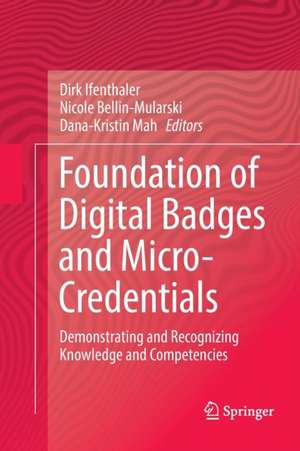Foundation of Digital Badges and Micro-Credentials: Demonstrating and Recognizing Knowledge and Competencies
Editat de Dirk Ifenthaler, Nicole Bellin-Mularski, Dana-Kristin Mahen Limba Engleză Paperback – 30 mai 2018
| Toate formatele și edițiile | Preț | Express |
|---|---|---|
| Paperback (1) | 1656.68 lei 6-8 săpt. | |
| Springer International Publishing – 30 mai 2018 | 1656.68 lei 6-8 săpt. | |
| Hardback (1) | 1698.76 lei 6-8 săpt. | |
| Springer International Publishing – 8 iul 2016 | 1698.76 lei 6-8 săpt. |
Preț: 1656.68 lei
Preț vechi: 2020.34 lei
-18% Nou
Puncte Express: 2485
Preț estimativ în valută:
316.100€ • 331.87$ • 262.30£
316.100€ • 331.87$ • 262.30£
Carte tipărită la comandă
Livrare economică 05-19 aprilie
Preluare comenzi: 021 569.72.76
Specificații
ISBN-13: 9783319792187
ISBN-10: 3319792180
Ilustrații: XXVIII, 530 p. 47 illus., 23 illus. in color.
Dimensiuni: 155 x 235 mm
Greutate: 8.37 kg
Ediția:Softcover reprint of the original 1st ed. 2016
Editura: Springer International Publishing
Colecția Springer
Locul publicării:Cham, Switzerland
ISBN-10: 3319792180
Ilustrații: XXVIII, 530 p. 47 illus., 23 illus. in color.
Dimensiuni: 155 x 235 mm
Greutate: 8.37 kg
Ediția:Softcover reprint of the original 1st ed. 2016
Editura: Springer International Publishing
Colecția Springer
Locul publicării:Cham, Switzerland
Cuprins
Part ITheoretical Foundation of Digital Badges.- Chapter 1 Digital Badges andMicro-Credentials: Historical Overview, Motivational Aspects, Issues, andChallenges.- Chapter 2 A Philosophy of Open Digital Badges.- Chapter 3 KeepCalm and credential On: Linking Learning, Life and Work Practices in a ComplexWorld.- Chapter 4 Drivers, Affordances and Challenges of Digital Badges.-Chapter 5 Evaluating the Public Promise.- Chapter 6 Building Collective Beliefin Badges: Designing Trust Networks.- Chapter 7 Learning Journeys in HigherEducation: Designing Digital Pathways Badges for Learning, Motivation andAssessment.- Part II Technological Frameworks and Implementation.- Chapter 8Badging Platforms: A Scenario-based Comparison of Features and Uses.- Chapter 9Adopting Digital Badges in Higher Education: Scoping the Territory.- Chapter 10Passport to Designing, Developing and Issuing Digital Instructional Badges.-Chapter 11 Transforming Workplace Learning Culture with Digital Badges.-Chapter 12 The Role of Endorsement in Open Badges Ecosystems.- Chapter 13Implementing a Badging System Faculty Development.- Part III Learning andInstructional Design Considerations.- Chapter 14 Toward a ComprehensiveTheoretical Framework for Designing Digital Badges.- Chapter 15 Digital Badgesand Micro-credentials: Digital Age Classroom Practices, Design Strategies, andIssues.- Chapter 16 Digital Badges: Purposeful Design in Professional LearningOutcomes for K-12 Educators.- Chapter 17 Height vs Depth in Badging Framework Design.-Chapter 18 What We Can Learn about Digital Badges from Video Games.- Chapter 19Digital Badges as (parts of) Digital Portfolios: Design Patterns forEducational and Personal Learning Practice.- Chapter 20 Badge Claims:Creativity, Evidence and the Curated Learning Journey.- Part IV Case Studies:Practices and Experience.- Chapter 21 Digital Badges for ProfessionalDevelopment: Teachers’ Perceptions of the Value of a New CredentialingCurrency.- Chapter 22 When Digital Badges Work: It’s Not About the Badges, It’sAbout Learning Ecosystems.- Chapter 23 The Authority Behind the Badge: APractice Analysis Case Study.- Chapter 24 Student Perceptions of Digital Badgesas Recognition of Achievement and Engagement in Co-Curricular Activities.-Chapter 25 Applied Gamification: Creating Reward Systems for OrganizationalProfessional Development.- Chapter 26 Implementing Digital Badges in Australia:The Importance of Institutional Context.- Chapter 27 Development andImplementation of Digital Badges for Learning Science, Technology, Engineeringand Math Practices in Secondary Contexts: A Pedagogical Approach with EmpiricalEvidence.- Epilogue.- Chapter 28 Moving Forward with Digital Badges inEducation.
Notă biografică
His previous roles include Professor and Director, Centre for Research in Digital Learning at Deakin University, Australia, Manager of Applied Research and Learning Analytics at Open Universities Australia, Professor for Education and Interim Department Chair at the University of Mannheim, Germany, as well as Associate Professor for Instructional Design at the University of Freiburg, Germany. He is the Editor-in-Chief of the Springer journal Technology, Knowledge and Learning and a member of the Editorial Board for Educational Technology Research and Development. Dirk is the 2013-2014 President for the AECT Design and Development Division, 2013-2015 Chair for the AERA Special Interest Group Technology, Instruction, Cognition and Learning and Co-Program Chair for the international conference on Cognition and Exploratory Learning in the Digital Age (CELDA). Nicole Bellin Mularski is a research assistant at the Department of Applied Teaching and Learning Research at the University of Potsdam, Germany. She received her M.A. and Phd from Freie Universität Berlin, Germany and eventually worked as a research assistant in the fields of curriculum development, at the Technische University of Dresden and school development of full-day schools, and SES and migration related achievement disparities in elementary education at the Department of Empirical Education at the Freie Universität Berlin. She received her M.A. in Educational Science from the Berlin Institute of Technology, Germany, including a semester at Stockholm University, Sweden. She worked as research assistant in the fields of higher education, analysing doctoral candidates’ supervision and students’ satisfaction within their university.
Textul de pe ultima copertă
This edited volume provides insight into how digital badges may enhance formal, non-formal and informal education by focusing on technical design issues including organizational requirements, learning and instructional design, as well as deployment. It features current research exploring the theoretical foundation and empirical evidence of the utilization of digital badges as well as case studies that describe current practices and experiences in the use of digital badges for motivation, learning, and instruction in K-12, higher education, workplace learning, and further education settings.
Caracteristici
Explores the emerging field of digital badges and how they can enhance education
Discusses the use of digital badges in many educational settings, from K-12 to the workplace
Gives insights into how digital badges offer novel means and practices in education, backed by theoretical underpinnings, and case studies
Includes supplementary material: sn.pub/extras
Discusses the use of digital badges in many educational settings, from K-12 to the workplace
Gives insights into how digital badges offer novel means and practices in education, backed by theoretical underpinnings, and case studies
Includes supplementary material: sn.pub/extras










